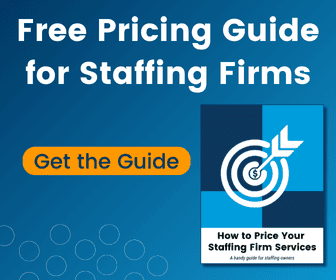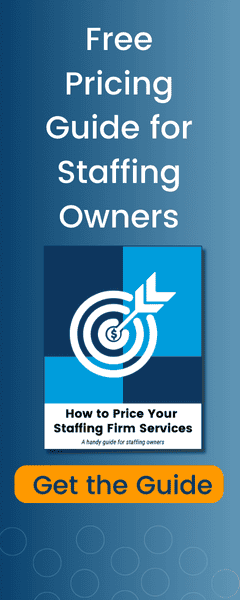How to Sell Your Staffing Firm

Last time updated: November 6, 2025

If you own a staffing agency, you’re in a uniquely strong position. The staffing industry boasts steady 3–4% annual growth, and verticals like IT or healthcare staffing are surging at double-digit rates. As a result, strategic buyers are actively seeking acquisitions to expand their footprint in lucrative markets.
But selling your staffing firm is more than a simple transaction—it’s a strategic exit that can maximize the value of years of hard work. The process is complex, requiring careful planning, a strong understanding of staffing agency valuation, and expert guidance. This guide covers everything you need to know about how to sell your staffing firm: from getting your business “sale-ready” to finding the ideal buyer.
How to value a recruitment business?
Buyers acquire staffing firms to enter new geographic markets, expand service offerings, or capture additional customers. The first step in any sale is understanding what your business is worth.
Key valuation factors for staffing agencies include:
- Recurring revenue is valued higher than perm placement (temporary and temp-to-hire placements offer more reliable cash flow)
- EBITDA and EBITDA multiples (typically staffing firms trade at a multiple of their trailing 12-month earnings, depending on growth and market factors)
- Annual sales and gross profit margin
- Client diversification and concentration risk (a diversified portfolio is worth more)
- Geographic location and industry focus
Valuations in staffing usually fall within a range—firms with strong margins, clean books, and diversified business models attract the highest multiples. Having an outsider help with your staffing agency valuation, such as an advisor or experienced funding partner, can provide objective insight.
Case Study:
“We talked about selling our business for years but didn’t know how to put a plan together. Once we were ready to sell, Advance helped us with a valuation and broke down what went into that number. We felt confident we understood the value of our business and met with a broker who assisted us with the actual sale of our business.”
—Sabrina P., Staffing Firm Owner
What Buyers Look For in Staffing Firms
Staffing firm buyers have particular attributes in mind when evaluating an acquisition. The most attractive businesses typically have:
- Strong EBITDA and margin performance
- Niche focus—specialization in fast-growing verticals like IT, healthcare, or engineering
- Clean financial records and robust compliance with regulatory standards
- Diversified and recurring revenue streams
- Well-developed internal teams with non-compete agreements in place
Timing the Sale of Your Staffing Firm
When is the best time to sell a staffing agency?
Timing can mean the difference between an average payout and a premium price. The best outcomes typically happen when:
- The business is enjoying several years of strong growth and profitability
- You’re selling into favorable market conditions (not during sector downturns or economic uncertainty)
- Avoid selling after major client losses or leadership departures—these events can depress valuation multiples
If possible, plan your exit at least 3–5 years in advance to optimize your outcome.
Watch our Webinar:
Learn How Much Staffing Agencies Sell For
Set yourself up for success.
You want to sell your business at exactly the right time because buyers are most interested when the outlook of your business is the brightest. This takes some planning, so it helps to make the necessary moves 3-5 years ahead of time. Here are some of the things to concentrate on while planning an acquisition. It’s smart to start positioning your firm for sale well in advance. Here’s how to prepare for a lucrative exit:
Hitting on all cylinders
Buyers are most interested in staffing firms that are outperforming the market with higher profit margins and diversified solutions. Stepping back and taking a hard look at your business through a SWOT analysis or other tools will help you see where you are lacking and what to improve.
Spreading customers over different industries
Customer concentration is a risk for buyers, so one thing to focus on is looking at the industries of your customers and if needed, spreading your base across different industries.
Temporary vs. perm placement
If more than 10% of your revenue is coming from long-term placement, it could have a big impact on valuation. Temporary staffing, or temp-to-hire, agency revenue is considered a recurring revenue stream while anent positions are not. Focus your job openings on short-term placement, this type of job seeker will add value to your bottom line.
Motivate your internal team
Buyers are looking for continued success, and a huge part of that is the strength of your management and employees. Work with your human resources department to empower your internal team and focus on developing a strong sales team. It’s also recommended that you have non-competes in place for your employees.
Checklist: Pre-Sale Readiness
- Reduce reliance on any single client or industry
- Prepare clean financials (see due diligence section)
- Standardize processes and technology
- Formalize non-compete and employment agreements
- Evaluate scalability (can the firm grow post-acquisition?)
Find the right buyer.
Securing the right buyer is crucial to a successful staffing firm sale. There are a few paths to consider:
- Strategic Buyer: Often an established staffing company seeking market share or an entry into a new niche.
- Private Equity Buyer: Investor groups looking for solid EBITDA, growth potential, and recurring revenues.
- International vs. Domestic Expansion: Some overseas firms may pay a premium for U.S.-based staffing firms.
- Multiple Bidders: Involving several buyers increases your negotiation leverage and could drive a better final sale price.
A structured earn-out (where you get paid for hitting performance goals post-sale) is worth considering, but make sure you understand all terms and expectations.
Common Mistakes to Avoid When Selling a Staffing Firm
Selling your recruitment agency is a high-stakes process—avoid these pitfalls for a stronger transaction:
- Overvaluing your business compared to market comps
- Excess dependence on one client or niche
- Entering negotiations without an M&A advisor or guidance
- Neglecting compliance or ignoring financial clean-up
- Failing to properly communicate with internal teams, risking key talent loss
Preparing for Due Diligence
Buyers will conduct thorough due diligence before considering your offer. You should be ready to provide:
- 3–5 years of audited financial statements
- Documented client contracts, non-competes, and vendor agreements
- Proof of tax compliance and accurate payroll records
- Scalability documentation: evidence of robust technology, efficient back-office processes, and growth potential
Having these items organized will expedite the sale and enhance your credibility.
Save time and get strategic guidance
If you’re thinking about selling your staffing firm, proactive planning is essential—ideally three to five years before your target date. Advance Partners has helped many agency owners prepare for sale, connect with M&A professionals, and navigate all phases of the process.
Ready to get strategic about your exit?
Contact Advance Partners today to speak with an expert and begin planning your staffing agency’s successful transition.
Conclusion
Selling your staffing firm is not just a financial transaction—it’s a strategic exit that can set up your next chapter for success. With careful preparation, savvy negotiation, and the right guidance, you can maximize your firm’s value and achieve your goals.
Explore Advance Partners’ M&A guidance resources or request a consultation today to get started.
FAQs: Selling a Staffing Agency
How do you value a staffing firm?
Staffing agency valuation is usually based on EBITDA multiples, revenue, client diversification, and recurring revenue streams. Engaging with expert advisors can help you determine a competitive sale price.
What types of staffing firms are most attractive to buyers?
Buyers especially seek firms with strong EBITDA, niche industry focus (like IT or healthcare), clean books, and diversified client portfolios.
How long does it take to sell a staffing agency?
The sale process often takes 6 months to a year, depending on buyer profiles, negotiation complexity, and market conditions.
Can I still be involved after selling my firm?
Yes. Many deals include structured earn-outs or transitional roles for former owners. Your involvement level depends on deal structure and the buyer’s preferences.
Should I use a broker to sell my staffing agency?
Working with an M&A broker or advisor is strongly recommended—they can help maximize sale price, navigate negotiations, and streamline the transaction process.
Up Next















